My elementary school library was a paradise. I don’t remember much about it, other than that when I was there, I was left alone to do what I like best – read. I don’t remember whether there were other people in the library, but my sense was that I was alone. The librarian is, in my memory, an amorphous shape, watching me kindly without interfering. It was quiet oasis, full of my best friends, books.
In the stacks, in the back left corner of the first row was the pile.
…and dozens more Classics Illustrated comics.
This huge pile of classic comics were my key into a kingdom of literature in which I still maintain a summer home. It was through these brightly colored, “Boy’s Own”-type stories that I was moved to read some of the best – and some of the worst – American and British Literature had to offer.
I devoured these comics. I spent every moment I could in that library and when I had read and re-read every comic in that pile, I turned to the rest of the stacks and started to read the books synopsized in those comics. This was an act whose fruit was born when I was in high school and realized that I was the only one in my class who had heard of, much less already read, everything we covered in Freshman literature. (Except John Knowle’s A Separate Peace which I still am angry and resentful about being made to read.)
Classics Illustrated had it all – characters and plots that had stood the test of time, psychological drama, rollicking adventures, the kind of insight on the human condition I was never going to find in Walter Farley’s horse series.
Crime and Punishment as a comic? Hell yes. Dr. Jekyll and Mr. Hyde? It was *made* to be a comic book. In fact, if Robert Louis Stevenson was alive now, I wager he would be a famous comic writer. (Okay, probably not, but it’s a fun thought.)
In my comic collection I still retain several Classics Illustrated, and while I don’t take them out and read them anymore, I would feel that a piece of my history was gone if I didn’t have them safely tucked away. When I started to seriously collect comics as an adult, these were among the first I added to my collection. Not the holes in the candy-store bought Fantastic Four arc with the reverse-time traveling aliens, (the first story arc I ever really followed…and then immediately regretted it, as it progressively devolved into badly written suck and which I barely remember now, thank you god) but stories that have been seminal for me since those days many years ago.
I suppose that my only regret now is that so few books about or by women were represented. Okay, Scarlet Pimpernel by Baroness Orczy, yes. But, how much of my later intolerance for Jane Austen can be attributed to the fact that there was no Pride and Prejudice in that pile? And yes, I will admit that nothing (NOTHING!) will ever make Wuthering Heights into a good book in my opinion, I now can’t help but wonder if I would have enjoyed a very pretty Heathcliff and Katherine in comic form. These do exist as Classics Illustrated, by the way, they just weren’t in that particular pile in that library, at that moment.
And now, as I sit here thinking over the moment in Ivanhoe when the Unfettered Knight shows up and I said to my 11-year old self, “well, duh, that’s obviously King Richard,” I’m wondering where the hell the Classics Illustrated version of Well of Loneliness is? C’mon folks, Tale of Genji is a story of a pretty boy, his clothes and the women he treats like shit, then Well of Loneliness is perfect for a Classic comic. It’s the story of a woman, her clothes and the woman she treats like shit.
Classics Illustrated aren’t gone, by the way. This isn’t some mopey pining for a lost piece of my childhood. I don’t do that. Classics Illustrated still exists and now include more stories by and about women. They are still an awesome way to introduce a young person to great literature and to comics.
And now I think I’ll contact my old elementary school and ask if I can buy them a collection of the darn things. There’s an eight-year old out there who needs them.

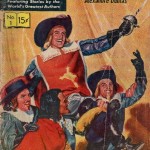
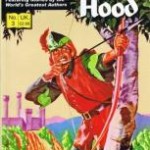
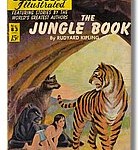
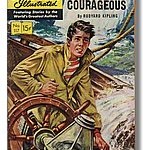
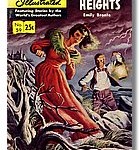
“Except John Knowle’s A Separate Peace which I still am angry and resentful about being made to read.”
Ditto.
Erica, your first sentence struck me strongly after reading this earlier this week.
I can’t imagine what it will be like when children lose their access to these kinds of experiences.
Very nice essay.
DerikB – I once asked a schoolteacher why we had to read crap like that and she told me that it was because 1) it had some specific qualities that they wanted us to know about 2) It was readable in a short time and 3) it was semi-appropriate for teens.
I understood and appreciated the limitations they work under, but gah, what a wretched story.
Caro – Thanks! It’s been in my mind a lot. I support my local library with donations all the time, but have been thinking of the critical role my elementary school library played in my development.
My middle-school library was the exact opposite- it was huge, neat, and filled with reference books we could never take out, because the librarian didn’t like kids.
In High school, I loved the librarian, but the library was worthless. It was filled with outdated garbage. No current reference texts, Cherry Jones, Nurse Student novels and other dusty stuff. I donated a book so I’d have something to read. That elementary school library was the best of the bunch and I wish I knew the librarian’s name to thank him or her.
We had a teacher who was adamant about the importance of reading A Separate Peace for high school juniors. I thought it was all right at the time, though I can’t say I’ve thought much about it since…. Does anybody who’s not in high school read it?
Among other things, it’s very focused on upper-class guys, right? Are there even any female characters at all? I can’t remember any….
Noah –
There are a few women – they are the spoils of war, mostly. Princesses to be rescued and all that. It’s not like that’s different than all of “literature” pretty much.
There’s still an awful dearth of “literature” that has women out doing something without needed to be rescued by the tall, dark, handsome, male love interest. Based on the popularity of Twilight, I don’t see that going away any time soon.
Don’t get me wrong – I’m not rolling over and accepting it. I just write my own, so I have something to read.
Twilight’s a little more complicated than that. Bella does get rescued on and off throughout, but there are a number of effectively violent female vampires…and Bella saves everybody at the end of the series.
Noah – I may be mistaken, but I am led to believe that Bella “saves” everyone by being, rather than doing. The Virgin Mary of the series, not the Joan of Arc.
I’ve heard that theory. I don’t think it’s especially convincing. Bella has superpowers, certainly…but, then, so does superman. There’s a lot of attention paid in the book to Bella practicing and honing her abilities, which is presented as entailing both mental and emotional pain for her. She finally is inspired by her love for her family to a display of power that she didn’t seem capable of before — but I don’t see that as meaning that she doesn’t get credit for it. In fact, at the end of the book, the narrative is at some pains to emphasize that she saved everyone.
She’s also shown to be resourceful and smart in other respects. She saves her unborn child, for example, basically by being smarter than her supposedly supersmart vampire boyfriend.
I’d be the last to claim that Twilight is ideal in every way in terms of gender politics — but as these things go, it’s really not bad. If you’re interested I’ve written about it at length. You could start here and if you’re not entirely disgusted by the end of that you could also read this.
In that latter one, I specifically talk about Joan of Arc in relation to Twilight, for what that’s worth.
Actually, it was the unborn child bit that I objected to. From what I can tell, she’s valued more for her future progeny than for herself.
But, I’ll be honest here – nothing at all about Twilight seems like a good read to me, so I’m really trying to stay hands off.
My reaction to Twilight (and to Pride and Prejudice, for that matter) is that for a book about a girl, it spends most of the time looking at the guy (broody, dark, handsome, blah, blah) and is, therefore, of little interest to me.
I would argue strongly that the characterization of Pride and Prejudice you’ve got there is almost completely unrecognizable. Darcy is absolutely not the focus of the book, and he’s neither particularly dark nor especially broody. Pride and Prejudice is mostly a comedy — and a very funny one at that. You might want to look at it again? My wife hated it for 20 years or something; I finally prevailed on her to reread it and she was delighted — whipped through all of the Austen’s extant. You seem to think it’s a gothic equivalent to Wuthering Heights, which it really, really is not.
Bella is not valued more for her progeny. In fact, Edward and Jake both really, really hate the baby which is killing her. The abortion stuff is tricky, and Meyer is a conservative Mormon — but the book very much makes the decision to abort or not Bella’s, not anyone else’s.
There’s no reason to read it if you’re not interested — it’s not that good or anything. But I tend to think the virulence with which it’s been attacked has more to do with its popularity and its audience than with the actual gender politics — which, as I said, aren’t that bad in comparison to a lot of stuff that’s out there.
Pride and Prejudice, though, is about my favorite novel ever (it varies between that and Persuasion and Northanger Abbey. And maybe Middlemarch.)
I could see Robert Louis Stevenson as one of those mainstream writers (like Brad Meltzer or Stephen King) who dabbles in comics.
As for “Pride and Prejudice:” I think Suat had a post a while back (regarding classical Chinese literature) where he discussed the difficulties of translating slow-paced dramas into comics form. In literature, the dialogue and narration can add nuance to what is, on the surface, a mundane scene. That’s harder to do in comics art, unless the comic has an exceptionally talented artistic team.
My wife is a humongous Austen fan and she’s perplexed by your description. She says, “Darcy *is* broody (and dark, but you can blame Colin Firth for that) and sure, there’s some funny social commentary, but it’s not a “comedy.”
I read it and while it has some excellent snark, I also would not call it a comedy. The focus of the whole novel is on how – unfairly, but it has to be said – women rely on marriage as their only hope for livelihood.
The entire story is women talking about marriage prospects. I honestly can’t imagine that you don’t see that.
Darcy isn’t broody (sad, filled with uncategorizable angst.) He’s stuck up. There are some similarities (both are distant), but I think they’re pretty different ultimately. (And he stops being stuck up at the end, which is kind of the point.)
It’s about marriage prospects, sure — for men as well as women. It’s a romance (or a romantic-comedy, if you will)! But it’s as much about satirizing women’s obsession with that as promoting it (right from the supremely snarky first line.) And Elizabeth certainly has other concerns than marriage, which is why she keeps turning down marriage offers, and is horrified when her friend accepts an idiot for a husband.
Austen’s of her time, of course, and she’s not a feminist. But Elizabeth is one of the smartest, funniest women in literature. I just have trouble seeing it as a text that denigrates women.
I think Pride and Prejudice is a “comedy of manners.” It’s not, however, a farce.
I think Noah’s trying to draw a distinction between Darcy and Heathcliff…
I don’t disgree that Austen’s of her time, and Elizabeth is smart, but maybe you out to spend a few hours in a room of women discussing P&P or Twilight. The conversation actually does revolve around the desire for women “to be rescued by the tall, dark, handsome.”
When I read a book about a woman, I insanely want it to focus on the woman, not on her obsession about a man, for whatever reason.
Then you shouldn’t read romances obviously (or not straight ones!)
I do get what you’re saying, but…many, many women and men are really, really interested in love. Obsessed with it even. Have been for a long time. If you want to draw a line in the sand declaring that any book which focuses primarily on that is uninteresting, that’s obviously your right — but lots and lots of women, and lots and lots of feminists disagree with you (not that that should change your mind, of course!)
Austen isn’t particularly focused on having her heroines saved; she’s really not a gothic writer. The Bronte’s hated her, you know — and Northanger Abbey is a hysterical send up of the gothic genre. The hero in Persuasion isn’t at all dark — and Sense and Sensibility pillories the dark, brooding lover as a self-indulgent, untrustworthy idiot. You may well have read some Austen, but claiming that it’s all about dark, brooding saviors suggests to me that the romance plot is so uninteresting to you that you’re not paying very close attention to what she’s doing (which, again, isn’t a sin or anything.)
Novels like the Gothic novels of Clara Reeve or Ann Radcliffe are very strong “rescue fantasies,” very much like the way you’re describing Twilight (which I haven’t read or seen).
There’s something comical, isn’t there, in that context where the heroes were rescuing the women from abject terror and physical abrasion, in thinking of Darcy as “rescuing” Elizabeth from anything? Since he’s mostly saving her from boredom and bad sex? In other novels of the day, that “boredom and bad sex” was depicted as something that didn’t matter, that women not only didn’t need rescuing from but should strive to find as quickly as possible, especially if it came accompanied by 100 pounds a year.
Austen’s novels are heterocentric; they’re not sexist. In 2010, heterocentrism is a species of sexism, but in 1810, the fact that Austen was even pointing out and satirizing the extraordinary pressure on women to make “successful” heteronormative marriages at any cost was groundbreaking. Just the idea that Elisabeth would want to get rescued from a dull marriage was a big step forward.
I do think, Noah, that the old distinction between comedy and tragedy matters: it’s not impossible to see at least some of Austen’s heroes as “brooding comic heros” contrasted with the Brontes’ “brooding tragic heroes.” Technically Gothic is neither comedy nor tragedy (because it’s the tragic mode, with a happy ending), but it’s closer to tragedy, I think.
I think Austen plays with the brooding archetype, mostly to undercut or mock it. Sense and Sensibility is pretty clearly about the idea that cultivating flagrant moping is idiotic and unfair to those around you.
Once you drop saving to “rescuing you from a bad marriage,” it pretty much goes both ways, doesn’t it? Especially in Persuasion, it’s pretty clear that Anne is “saving” her lover (who was about to make a very bad match) as much as the other way round.
Twilight is very aware of both Wuthering Heights and Pride and Prejudice; they’re both quoted throughout. And it works with the idea of saving and being saved; Bella saves Edward several times, as well as the other way around. (It alternates book to book almost deliberately, now that I think of it.)
Austen’s novels are heterocentric, but she certainly has important relations between women. You see more of Elisabeth interacting with her women friends than with Darcy overall, I think….
Not sure where I said that, Noah. Not sure what you’re arguing about either.
What I said was, “My reaction to Twilight (and to Pride and Prejudice, for that matter) is that for a book about a girl, it spends most of the time looking at the guy (broody, dark, handsome, blah, blah) and is, therefore, of little interest to me.”
I stand by that. *My reaction* to these books – not some objective all encompassing statement that they *are* only about one thing, but that I feel as if I’m forced to stare more often than I like at the love interest, rather than watch the protagonist.
I don’t read romances, except Yuri ones and only to review them, and even then I’m famous for wanting the bits that come after the “happily-ever-after” part, stories of which are rare in any genre.
Caro – I think it’s fair to say that Darcy “rescues” Elizabeth from 1) worry about finances, 2) a bad marriage and 3) boredom with a conventional husband
I like the idea of seeing Austen’s heroes as “brooding comic heros” contrasted with the Brontes’ “brooding tragic heroes.” That totally works for me. :-)
And this is all a far cry from a light nostalgic piece about books I enjoyed. :-)
I’d always prefer the stories where the characters were out slamming around on horseback fighting than stories where everyone’s sitting around in the drawing room and sniping.
Ah, well, if you look above, I didn’t say you were making general statements; just that many people disagree with you about what is or is not interesting.
In any case, if you don’t want to read romances, and really, really don’t want to read heterosexual romances, obviously Austen won’t have a lot to offer you (and Twilight even less!)
I do think, as Caro suggests, that romance is often, or can often be, feminist. Not always, of course, but more often than it’s sometimes given credit for.
Well, obviously lots of people will disagree with my perspective. lol
I think we’re talking about two different things. I’m absolutely not talking about whether these books are feminist or not. I’m talking about whether they are focused on the protagonist or not.
For me, a “strong female protagonist” means that the book spends more time looking at the protagonist that at her love interest. In this way (and in every other) I think P&P is superior to Twilight. But they still are romances. I’d just as soon be reading about a protagonist out riding horses, shooting arrows and swinging swords, which was kind of my original point.
Well, I”m happy to leave it there.
I like those other kinds of books too! Thus my obsession with Wonder Woman….
Erica, thank you so much for this article; Classics illustrated was so important to me as a child. i remember the murder of Nancy by Bill Sykes in the Classics ‘Oliver Twist’ as the most terrifying hooror comic I’ve ever read…and when her ghost came back to haunt him I screamed out loud!
You may not know of a 1970’s Classics line launched by Marvel, but it had some really great stuff. ‘Ivanhoe’ by Jess Jodloman, ‘Alice in Wonderland’ by Alfredo Alcala, ”The Cask of Amontillado’ by Michael Golden, ‘Moby Dick’ by Alex Niño… a treasure trove available at rock-bottom prices!
I’m glad to know of that, Alex – thanks for the heads up. I do know of the late 80s/early 90s black and white perfect bound volumes of Classics Illustrated. We had them for years and gave them to a niece. Wish I had them back so I could give them to the library.
“When I read a book about a woman, I insanely want it to focus on the woman, not on her obsession about a man, for whatever reason.”
I actually prefer Beck Sharp (of Vanity Fair) to Elizabeth. Could that be taken as vaguely sexist?
“Sense and Sensibility pillories the dark, brooding lover as a self-indulgent, untrustworthy idiot…”
Are you talking about Edward Ferrars here? Seems a bit extreme if you are. I mean, he’s still the “noble” (exemplary values for the time) lover who Elinor marries in the end. Then again, I’ve only read the book once so I’ll probably defer to your greater knowledge.
One of the more impressive modern iterations of the Classics line is Sienkiewicz’s take on Moby Dick.
Not Edward; John Willoughby. The guy who breaks Marianne’s heart.
Becky Sharp is great! I’d forgotten about Vanity Fair; that’s a book I should read again….
some day i’ll re-read sense and sensibility, i like it a lot. my impression of willoughby was that he was egotistical, shallow and sometimes witty, but without being very dark or broody (at least up until he got stuck with a controlling girl who he married for money). i could be forgetting or overlooking something.
It’s possible my memory is colored by the movie, which made him dark and broody, and then mocked him for it. Overall I wasn’t that into that film, but I thought that was a good choice.
great column – but the comments were even more though provoking and i’d be quite interested in a column or two on straight and not-straight romance materials.